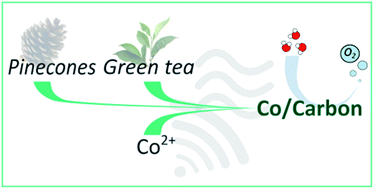Improving the electrocatalytic performance of sustainable Co/carbon materials for the oxygen evolution reaction by ultrasound and microwave assisted synthesis†
Abstract
The design of sustainable procedures for the preparation of cobalt/carbon-based materials as an anode for hydrogen fuel production through electrocatalytic water splitting has attracted much interest in the last few years. Herein, a novel environmentally friendly approach for the development of stable and active catalysts for the oxygen evolution reaction (OER) is reported. In detail, the methodology aimed at developing a sequence of composites having a low cobalt loading (<4%wt) using polyphenols extracted from green tea as metal stabilizers and activated carbon derived from pinecones as a metal-support as well as a co-active material. The approach exploited ultrasound (US), microwave (MW) and combined US/MW-assisted techniques with the purpose of enhancing the final electrocatalytic activity of these new composites, replacing conventional high-temperature approaches. The results indicated that the so-produced electrocatalytic materials followed the order of activity US > MW/US > MW > conventional heating, with the best sample requiring an overpotential of 365 mV to deliver a current density of 10 mA cm−2 and a Tafel slope of 58 mV dec−1.

- This article is part of the themed collection: Organic Materials for Energy Conversion and Storage


 Please wait while we load your content...
Please wait while we load your content...